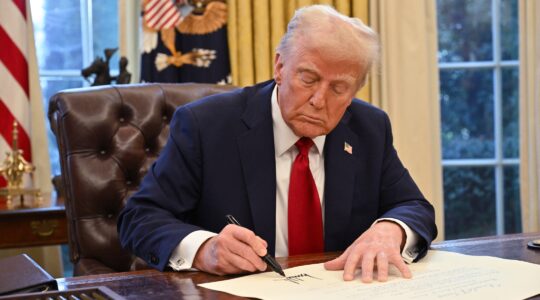WASHINGTON (JTA) – As 5,000 AIPAC activists ascend Capitol Hill this week, they will be pushing a multifaceted agenda with a clear bottom line: It’s the sanctions, stupid.
Some new wrinkles in the lobbying blitz that traditionally follows the annual American Israel Public Affairs Committee policy forum deal with the role of Arab nations in advancing Israel-Arab peace and with securing a pledged increase in U.S. assistance to Israel.
But the most dramatic advance is in a proposal to cut off refined petroleum exports to Iran, hitting 40 percent of that country’s gas market.
AIPAC has led the way since the mid-1990s in advocating for sanctions aimed at crippling the Iranian economy until the Islamic Republic ends its suspected nuclear weapons program. In recent years, the notion of sanctioning Iran has gained traction, with the U.N. Security Council imposing three sets of sanctions in the past 18 months.
Still, the sanctions regime has apparently had little effect: U.N. nuclear weapons inspectors last month delivered a blistering report saying that Iran was taking steps to hide its weapons program. In addition, inspectors say they have evidence suggesting that some elements of the Iranian program were military and not peaceful – in sharp contrast to Tehran’s claims.
After two days of sessions heavily weighted toward considering the possibility of a nuclear threat, 5,000 of the 7,000 activists will head to 500 meetings on the Hill armed with talking points for a bill that has languished in the U.S. Senate since it passed overwhelmingly in the House of Representatives last year.
The Iran Counter Proliferation Act would expand existing sanctions by hitting companies and nations that deal with Iran’s energy sector. It also would cut off Iran entirely from the U.S. finance system.
Bolstering that bill is a nonbinding resolution put forward last week by U.S. Reps. Gary Ackerman (D-N.Y.) and Mike Pence (R-Ind.). The resolution urges President Bush to immediately impose some of the sanctions in the Counter Proliferation Act and adds the new proposal: cut off the export of refined petroleum to Iran.
“Despite sitting on some of the largest oil reserves in the world, Iran has been forced to import 40 percent of its refined petroleum – gasoline and diesel – because of a lack of investment in its oil refining infrastructure,” states the memo prepared for AIPAC activists. “Limiting Iran’s ability to import gasoline will severely impact Iran’s economy and could lead to dramatically greater domestic pressure on the regime to change course.”
The language of the congressional resolution is sensitive to the political realities of a presidential campaign that has made the possibility of war against Iran a partisan issue: It explicitly counts out military action – a point hammered home in the AIPAC talking points.
“The resolution specifically states that nothing in the resolution shall be construed to be an authorization for military action,” the sheet says. “In fact, the sanctions called for in H. Con. Res. 362 are the best way to prevent Iran from acquiring a nuclear capability by avoiding military action.”
Additionally, the action part of the resolution opens by declaring “that preventing Iran from acquiring a nuclear weapons capability, through all appropriate economic, political, and diplomatic means is vital to the national security interests of the United States and must be dealt with urgently.”
Notably absent from AIPAC’s talking points is any mention of military force – a prospect that spooks Democrats and would discomfit an organization that prides itself on its bipartisanship.
The proposal falls just shy of reported suggestions from Israel’s government that the United States and Britain blockade Iran’s ports to keep out refined petroleum. Israeli Prime Minister Ehud Olmert reportedly brought up the proposal in conversations last month with U.S. Rep. Nancy Pelosi (D-Calif.), the House speaker. Olmert and Pelosi are addressing the AIPAC conference.
AIPAC in its talking points is generally careful to hew to areas where Democrats and Republicans agree when it comes to Iran. However, some of the language would appear to treat with skepticism specific policies associated with U.S. Sen. Barack Obama (D-Ill.), the likely Democratic presidential nominee who also is addressing the conference.
“Entering into a dialogue before Iran has complied with U.N. resolutions and suspended its uranium enrichment could undermine Security Council decisions and allow Tehran to use the dialogue as a way to continue advancing its nuclear program,” the AIPAC memo states. “Iran used previous talks with the European Union to make significant advances in its nuclear program while staving off international sanctions.”
That hardly jibes with Obama’s support for dialogue backed up by what he calls tough diplomacy; it sounds of a piece with the rhetoric of U.S. Sen. John McCain (R-Ariz.), Obama’s Republican rival.
Furthermore, in conference literature AIPAC proudly touts support in both the House and Senate for language declaring the Iranian Revolutionary Guards Corps a terrorist group.
Obama was not present for that vote, but said he would would have opposed the measure, a position favored by many liberal Democratic activists. The candidate had backed similar language, however, in separate legislation and it is not clear where he would stand on how the issue is now framed by AIPAC. Obama’s main Democratic rival in the primaries, U.S. Sen. Hillary Rodham Clinton (D-N.Y.), backed the language in both cases.
Also on the lobbying agenda is Bush’s proposal to increase U.S. assistance to Israel from an average of $2.4 billion to $3 billion annually. Letters circulating in both chambers of Congress urge the president to continue his efforts to advance the Israeli-Palestinian peace process.
The letters, initiated in the House by its leaders, and in the Senate by Mary Landrieu (R-La.) and Susan Collins (R-Maine), do not mention recent backing by Bush and Congress for increased U.S. financial and political support for Palestinian moderates. Instead they decry the alleged lack of such support from Arab nations.
“We anticipated more from nations that have claimed reaching such an agreement is one of their top priorities,” the letters say. “We struggle to understand why those Arab states that are flush with oil revenues cannot provide meaningful financial assistance to the Palestinian Authority.”
The emphasis underscores a tone throughout AIPAC’s materials that suggests a skepticism about the peace process. The talking points pose a question: “Can a peace agreement still be reached this year?”
Its answer is hardly committal: “Israel and the Palestinians have both made clear that any agreement reached will be subject to the implementation of the first phase of the ‘ road map.’ In Israeli eyes, this must include an end to violence and the dismantling of the terrorist infrastructure.”
JTA has documented Jewish history in real-time for over a century. Keep our journalism strong by joining us in supporting independent, award-winning reporting.





